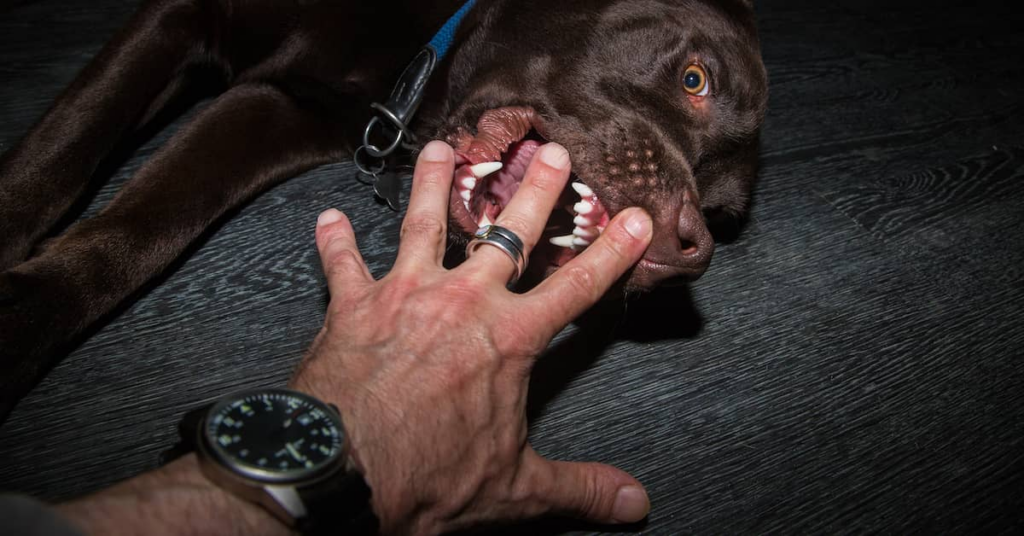
Dog bites should always be taken seriously. In addition to seeking prompt medical attention, you should also explore your legal rights as soon as you can after a dog bite injury.
The Flood Law Firm has extensive experience handling dog bite claims. Our dog bite injury attorneys can review your case for free and help you pursue the compensation you deserve.
3 Steps You Should Take Immediately After a Dog Bites You
Medical attention should be your first priority after a dog bite injury. Getting the necessary care may involve the following:
1. Call 911 for Serious or Life-Threatening Injuries
Dog bites that result in significant blood loss, bone fractures, and/or tissue damage are medical emergencies. The location of the wound is also important, with injuries to the face and neck in particular requiring immediate intervention.
If you or someone you love is seriously injured in a dog attack, call 911 immediately. Paramedics will assess the injuries and transport you or your loved one to the hospital as needed. The police should also be called to the scene to take a report of the incident.
2. Perform First Aid
Anyone who is bitten by a dog should see a doctor as soon as possible. If the injury does not require emergency treatment, there are steps you can take on your own before seeking professional medical care:
- Wash the wound with warm water and soap
- Apply light pressure to reduce bleeding
- Put some antibiotic cream on the wound (if available)
- Dress the wound with a bandage
- Keep the area elevated
3. See a Doctor
You should seek professional care for a dog bite injury on the day of the attack. Call your family doctor to see if you can get an appointment on the same day. If your doctor can’t see you right away, go to the emergency room or an urgent care clinic.
Medical professionals will examine and disinfect the wound and apply a dressing. You will also be prescribed antibiotics and advised of the possible signs of infection.
The doctor will also ask if you know the dog’s owner and the animal’s vaccination status. If you were bitten by a strange dog, the doctor may recommend that you get a rabies vaccine.
5 Steps to Take in the Aftermath of a Dog Bite Injury
Recovery should be your top priority after a dog attack. However, it is also important not to lose sight of your legal options after a dog bite injury.
Take the following steps to keep your recovery from the dog bite injury on track and protect your legal rights:
1. Follow Your Doctor’s Orders
After a dog bite, it is crucial to follow all instructions from medical professionals. This includes changing wound dressings, taking all prescribed medication, etc.
You may need surgery to repair tissue or nerve damage, as well as rehabilitation to restore function. It is important to keep all medical appointments and communicate with your doctor regularly to ensure that you are getting the care you need.
2. Watch for Symptoms of Infection
Infection is one of the most serious concerns following any dog bite. Dogs’ mouths are loaded with bacteria that can lead to major illness in humans.
Common symptoms of infection from a dog bite include:
- Swelling and pain around the wound
- Localized redness
- A warm feeling at the sight of the injury
- Loss of sensation or use of the injured area
- Pus draining from the wound
- Fever
- Chills
- Night sweats
- Weakness and fatigue
If you experience any of these symptoms after suffering a dog bite injury, you should seek medical attention as soon as possible. A wide range of complications may arise if an infected dog bite is not treated promptly.
3. Collect Evidence
Dog bite victims have the right to recover compensation for their injuries and damages. In Connecticut, plaintiffs are not even required to prove that the dog’s owner was negligent.
You need to be able to identify the dog and its owner to bring a dog bite injury claim. Ideally, you would be able to obtain the following information immediately following the attack:
- The first and last name of the dog’s owner
- Contact information for the owner of the dog
- The breed of the dog that bit you
- Vaccination status for the dog
- The owner’s insurance information
Unfortunately, it is often not practical to exchange information with the dog’s owner right after you have been bitten. You might not know who the owner is if you are attacked by a dog that is off leash and/or away from the property where it lives.
In these situations, eyewitness testimony is essential. Witnesses may be able to identify the dog and point you in the direction of the owner.
Again, ideally you would be able to talk to witnesses at the scene and get their contact information. But, if this is not possible, a police report should contain the names and statements of any witnesses to the attack.
4. Document Your Losses
You should keep a record of any and all expenses you incur as a result of the dog bite injury. The following are compensable losses in a dog bite claim:
- Medical bills
- Costs related to rehabilitation and therapy
- Expenses for mental health counseling
- Any out-of-pocket costs related to the injury, including prescription medications, assistive devices, travel and accommodations for medical care, etc.
You also need to keep track of how long you are unable to work and the wages you lose as a result of the dog bite injury. If your ability to work is adversely affected long-term or permanently, it is important to quantify damages for loss of earning capacity.
You should also photograph your physical injuries, including any scarring.
Finally, you should take stock of how the dog bite injury affects your life. It is helpful to keep a journal where you can record feelings of physical pain, anxiety, depression, trouble sleeping, etc.
Physical and emotional issues are not economic in nature. However, you may be entitled to monetary compensation for pain and suffering if you can present evidence of how the dog bite negatively impacts your day-to-day life.
5. Contact a Connecticut Dog Bite Injury Attorney
Dog attacks are traumatic. It takes time to recover from these injuries physically, mentally, and emotionally. You should not have to worry about legal issues when you are trying to get better.
When you hire a lawyer, you can focus on recovery while a qualified professional handles your claim. It is in your best interest to speak to a dog bite attorney as soon as possible.
Hiring an attorney is the best way to ensure that your claim is handled properly, that all necessary evidence is collected, and that all of your legal options are identified. A dog bite lawyer can represent you effectively in negotiations with the insurance company and provide guidance on whether to accept a settlement offer or fight for more (up to and including going to trial).
Bitten by a Dog in Connecticut? The Flood Law Firm Can Help
Dog bite injuries are serious. You need knowledgeable legal guidance to help you pursue the full compensation you and your family deserve.
Attorneys at The Flood Law Firm have extensive experience handling premises liability claims, including cases involving dog bites. We take immediate action to investigate the attack, gather pertinent evidence, and account for all of your losses. Our team provides aggressive representation during settlement negotiations, and we never hesitate to take cases to trial if it means achieving a better outcome for our clients.
Please call The Flood Law Firm at (860) 346-2695 today for a free case review. Our dog bite injury attorneys serve clients in Middletown, Danbury, Bridgeport, Waterbury, and throughout Connecticut.
